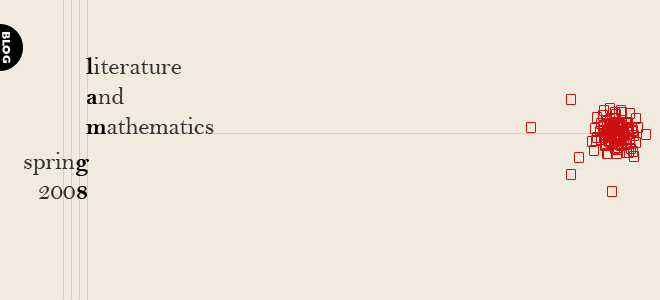History clearly displays humanity's persistent quest for control. From Adolf Hitler to Saddam Hussein, there are seemingly endless examples of leaders exploiting their power to control the people they lead and others. This quest can be observed on a macro level also by looking at the way man has pursued mathematical and scientific knowledge throughout history. These fields give man a sense of control over nature.
Why does man want control over his surroundings so badly? The things that he can control can't harm him. It is this fact that explains why the things that humans fear most are the things they have no control over: death, the unknown, tornadoes...
In We, this theme is by no means subtle. The One State is organized and governed for the most part by mathematical principles. In this society, man has "channeled all elemental forces--there can be no catastrophes"(23). All citizens live in glass houses. There are "Guardians" to keep watch on the happenings; they are to keep order. There is even a space ship (the Integral) being built for the purpose of integrating inhabitants of other planets into the controlled ways of the One Sate.
The citizens feel safe in the One State because everything around them is controlled. Although it is not controlled by them personally, it is controlled by an entity that they feel to be one with. It is apparent that D-503 values safety when he explains that "when man's freedom equals zero, he commits no crimes"(35). Protection from crimes is well worth giving up personal freedoms in D's mind. In fact, control and safety are so important to D that he can't stand the thought of i, the square root of -1. This is because it was "foreign, alien, terrifying. It devoured [him]--it was impossible to conceive, to render harmless, because it was outside the ratio"(39).
It is a sense of control, a feeling of safety, that sustains the "happiness" of the One State citizens. But it is only a matter of time before they realize that "[o]nly the unsubduable can be loved"(72).
Friday, January 25, 2008
The Ascendancy of Man in We: Humanity's Quest for Control
Subscribe to:
Post Comments (Atom)

2 comments:
I find that one line curious,
"when man's freedom equals zero, he commits no crimes".
It seems to me that on the opposite end of the spectrum, the same truth occurs, e.g. "When man is bound by no rules, he breaks no rules". Both of these seem to embody the ideals of radical extremes of the political spectrum (Anarchy <--------> Totalitarianism)
It is a little peculiar to me that people are content referring to the “One State” without having an grasp on who (or what) is really controlling them. There hasn’t been mention of an absolute ruler, governing council, or ultimate authority aside from the “Benefactor.” It seems hard that people would be so brainwashed as to accept authority without question. I mean, we are far from that today. There are always people throwing blame and criticism towards those in power. And yes, it feels good to have someone to hate. Can you imagine unconditionally loving George Bush? *shudder*
Post a Comment